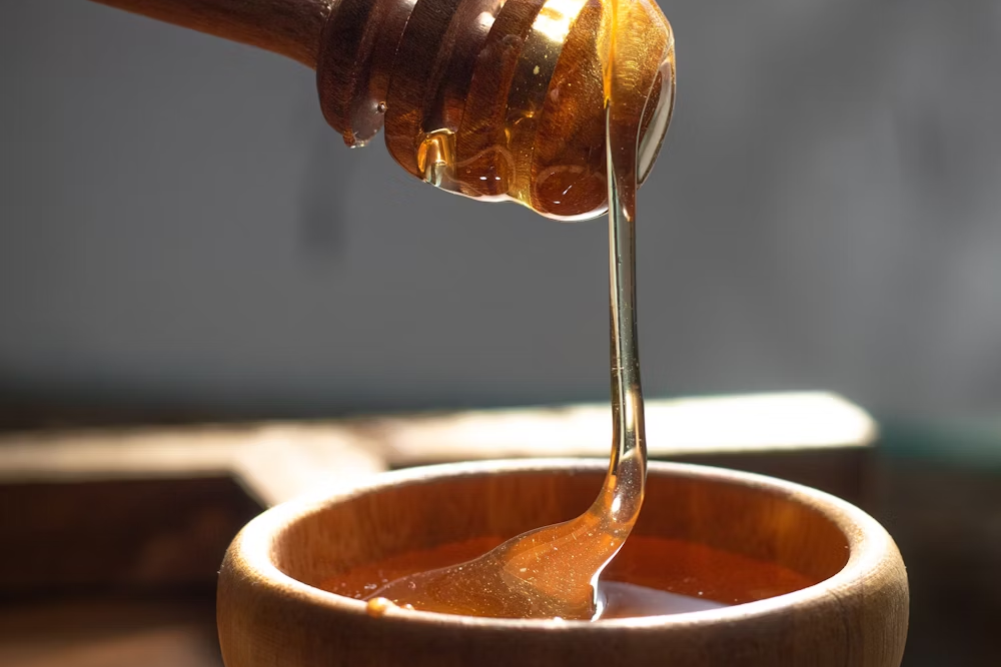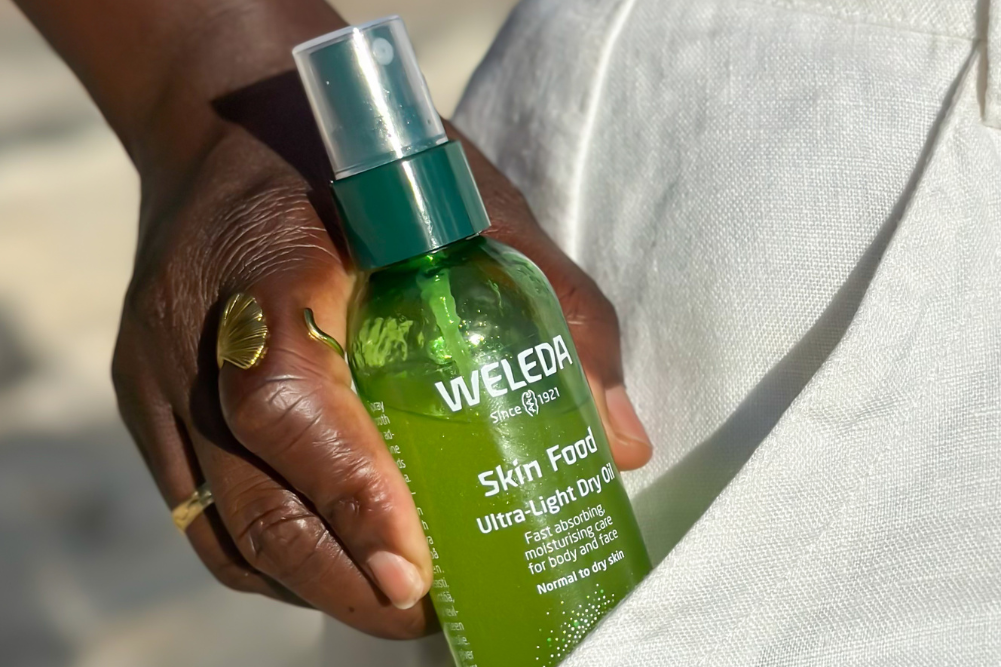Your winter beauty woes answered
Natural beauty tips and foods to reduce dry hair, skin and nails throughout the winter months.
Cold, crisp mornings slipping into woolly socks and oversized jumpers, big pots of soup bubbling away on the stove and slow evenings huddled by the fire sipping hot cacao; there’s no denying the idea of winter is very romantic.
While the chilly change in season brings so much beauty, it does come with its challenges as cold temperatures, low humidity and gusty winds can be harsh on the body.
Vitamin E makes an excellent base for face and hand creams, and has been shown to help combat dry skin and encourage wound healing.
The rapidly changing temperatures from heated indoors to cold outdoor environments have been shown to affect the skin’s capillaries, and prolonged exposure to wet weather can strip the skin’s barrier function, leading to dry, sensitive, chapped skin and lips, brittle hair and cracked nails.
If you suffer from skin conditions such as eczema, rosacea and dermatitis you may also experience a worsening of symptoms in the winter months due to your skin drying out from changing temperatures.
At times it may feel that you just have to grit your teeth, pull your scarf up and make it through to spring. However, fortunately there are a number of natural ways to help combat these symptoms, both internally through food and supportive nutrients and topically with healing botanicals and gentle lifestyle changes, so you can get back to enjoying all the charm winter has to offer.
How to combat the winter beauty woes
Avoid boiling hot showers and baths
It is tempting to soak in a hot bath in winter; however, it can actually make skin conditions such as eczema and psoriasis worse, as hot water strips the skin of its natural oils resulting in dry, itchy and irritated skin. Aim to have brief, lukewarm showers and baths to reduce irritating and drying out your skin. Once out of the shower use a rich, hydrating body cream or oil to soothe your skin.
Avoid using harsh chemicals on your skin
There are many products on the market that contain preservatives, stabilisers, mineral pigments, dyes, shines, fragrances, metals and numerous other substances that are added to enhance a beauty product’s effectiveness and shelf life. Many of these chemicals are known to be allergenic and irritating, so it is best to check your cleansers, face peels and body soaps to see if they contain any of these ingredients.
Additionally, it is a good idea to check the ingredients in your handwash and detergents, as harsh chemicals and alcohol have been shown to worsen dermatitis and can lead to dry hands and brittle nails. Instead, opt for organic, hypoallergenic soaps and cleansers that are based on natural oils and botanicals, as these are far gentler on sensitive skin.
Utilise the healing power of botanicals in your beauty products
As the seasons change so can your beauty products. Throughout the winter months invest in thick vitamin- and botanical-rich creams, lip balms and masks for added protection and moisture. A few beneficial botanical ingredients to look out for in your products include:
Vitamin E
Vitamin E is a fat-soluble antioxidant that combats free-radical induced damage. Vitamin E makes an excellent base for face and hand creams, and has been shown to help combat dry skin and encourage wound healing.
Calendula
Calendula has powerful anti-inflammatory and wound healing properties that make it a great addition in your moisturiser to soothe and heal chapped lips and inflamed skin
Beeswax
Beeswax is rich in vitamin A, which encourages wound healing, reduces fine lines, protects skin against sun damage and stimulates skin cell turnover. Beeswax can help retain moisture in the skin and reduce inflammation, which is especially helpful for dry and chapped lips.
Coconut oil
Coconut oil contains lauric acid which helps restore and strengthen the protein structure of your hair. It also has a low molecular weight, which enables the oil to penetrate inside the hair shaft, adding moisture and preventing hair breakage.
Aim to apply a coconut oil hair mask once per week throughout winter. Heat three tablespoons of coconut oil lightly so it is in a liquid form, apply this to the dry sections of your hair and comb through. Leave to soak in for 30 minutes, or overnight for a more intensive treatment. Wash hair well afterwards to remove the oil.
Stay hydrated
The skin is composed of 64 per cent water, and this vital essence is required to transport nutrients and oxygen to every cell in the body. When your skin and hair are dehydrated, they may look dull and dry and feel itchy. Heading out into a harsh winter gale will only exacerbate these symptoms.
While you may not feel as thirsty in winter as you would in summer, it is important to be conscious of hitting your daily water requirements. It is advised that women drink about 2.5 litres of water per day, while men should aim for 3 litres per day, and more when you are exercising. If you aren’t a big water drinker, sip on herbal teas throughout the day or flavour your water with lemon, lime and mint to make it a little more exciting.
Increase essential fatty acids in your diet
Essential fatty acids are fatty acids that the human body cannot make itself, and therefore relies on obtaining these through the food you eat. Essential fatty acids are the building blocks of cell membranes and play a fundamental role in reducing inflammation in the skin, encouraging wound healing, supporting the skin’s barrier function and integrity, attenuating UV damage and helping to keep your skin hydrated. Essential fatty acids can be found in wild-caught oily fish such as sardines, mackerel, salmon and herring, chia seeds, flax seeds, avocado, olive oil, flaxseed oil, nuts and seeds.
If you feel that you need a little additional support throughout winter, you could add in a high-quality supplement. It is important to remember that supplements should always complement a nutritious, wholesome diet and be taken under the guidance of a health practitioner.
Winter supplements
Here are some go-to winter supplements to support vibrant, healthy hair, skin and nails
Omega-3 EPA plus DHA essential fatty acids
If you are experiencing quite severely dry and irritated skin, or if you follow a predominantly vegetarian or vegan diet, it may be a good idea to supplement with an omega-3 fish oil or algae oil containing eicosapentaenoic acid (EPA) and docosahexaenoic acid (DHA). As previously mentioned, the human body is not able to create essential fatty acids, and therefore must obtain these through the food you eat. Vegetarian sources of fats such as flaxseed oil and nuts contain the precursor alpha-linoleic acid (ALA), which converts in small amounts to EPA and DHA. As the conversion rate is quite low, in times where a higher dose is required (such as the winter dry months to combat itchy, irritated and inflamed skin) a supplement may be beneficial. Doses of EPA plus DHA vary between 250mg and 1000mg per day and should be based on individual requirements.
Zinc
Zinc is an essential micronutrient required for correct functioning and integrity of the skin. Zinc is an anti-inflammatory, encourages wound healing and has been found useful in preventing UV-induced damage and reducing the incidence of malignancies. Zinc deficiency is a common problem, with an estimated one-third of the world’s population suffering from zinc deficiency due to inadequate levels in their diet or poor absorption arising from a compromised digestive system. The skin alone contains about 6 per cent of the body’s total zinc, so if this mineral is deficient you may notice symptoms such as poor wound healing, worsening of inflammatory skin conditions such as acne, psoriasis, eczema and rosacea or cracked nails. The recommended daily dose of zinc for an average adult male is 11 mg per day and 8mg per day for women, which increases to up to 12mg per day during pregnancy and lactation. Zinc can be obtained from oysters, beef, eggs and fish; however, if you are low in this mineral a good-quality supplement can be added. I recommend taking 30mg a day for one month.
Vitamin C
The skin contains high levels of vitamin C, and this powerful antioxidant is required for stimulating collagen synthesis, protecting the skin against free-radical and UV-induced skin damage. A deficiency in vitamin C may present as fragile, dry and dull-looking skin, and wounds or blemishes may be slow to heal.
Vitamin C is not naturally synthesised by the human body, and therefore adequate dietary intake of vitamin C is required. The richest natural sources of vitamin C are acquired from fresh fruits and vegetables such as citrus fruits, blackcurrants, rose hips, guavas, chillies and parsley. A supplemental dose of 1000mg of vitamin C a day can provide additional support for your skin.
Pre- and probiotics
The human gut microbiome describes the microorganisms (bacteria) residing and growing inside your digestive system. Pre- and probiotics play a role in recolonising and “feeding” beneficial bacteria in the digestive tract. Balance of our inner ecosystem is fundamental for healthy skin as the microbiome is responsible for eliminating pathogens and toxins, improving the absorption of nutrients, down-regulating inflammation, enhancing immunity and minimising hypersensitivity reactions that can lead to inflamed, red and irritated skin.
Prebiotics can be acquired from fermented food products such as sauerkraut and yoghurt, fibre including vegetables and resistant starches such as green bananas and cooled potatoes. Prebiotics play a role in feeding and re-establishing the preexisting beneficial bacteria.
Beeswax can help retain moisture in the skin and reduce inflammation, which is especially helpful for dry and chapped lips.
Probiotics are live microorganisms that can be supplemented. They aim to recolonise the numbers of beneficial gut microflora in your digestive tract. There are many different strains of bacteria in probiotics, and this can at times be confusing. If you need support please consult your health care practitioner.
By equipping yourself with gentle, nourishing botanical creams and balms, achieving your daily water requirements, eating a wholesome diet abundant in essential fatty acids and vitamin-rich fruits and vegetables plus adding in a supplement or two you can truly transform your hair, skin and nails from the inside and out through the colder months.
Your winter beauty woes will be a memory of the past.








